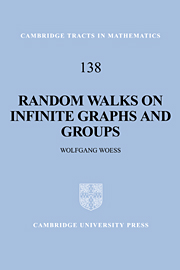Preface
Published online by Cambridge University Press: 22 September 2009
Summary
“Random walks” is a topic situated somewhere in between probability, potential theory, harmonic analysis, geometry, graph theory, and algebra. The beauty of the subject stems from this linkage, both in the way of thinking and in the methods employed, of different fields.
Let me briefly declare what - in my viewpoint - random walks are. These are time-homogeneous Markov chains whose transition probabilities are in some way (to be specified more precisely in each case) adapted to a given structure of the underlying state space. This structure may be geometric or algebraic; here it will be discrete and infinite. Typically, we shall use locally finite graphs to view the structure. This also includes groups via their Cayley graphs. From the probabilistic viewpoint, the question is what impact the particular type of structure has on various aspects of the behaviour of the random walk, such as transience/recurrence, decay and asymptotic behaviour of transition probabilities, rate of escape, convergence to a boundary at infinity and harmonic functions. Vice versa, random walks may also be seen as a nice tool for classifying, or at least describing the structure of graphs, groups and related objects.
Of course, random walks on finite graphs and groups are a fascinating topic as well, and have had an enormous renaissance in the last decade: a book written by two major experts, D. Aldous and J. Fill, is about to appear.
- Type
- Chapter
- Information
- Random Walks on Infinite Graphs and Groups , pp. viii - xiiPublisher: Cambridge University PressPrint publication year: 2000



